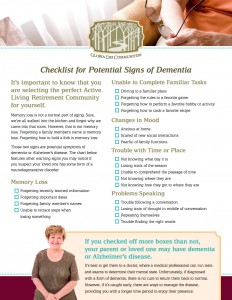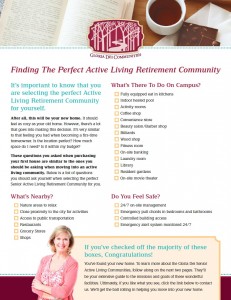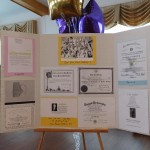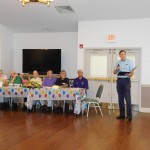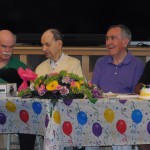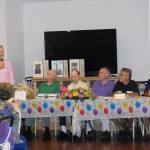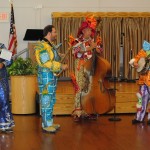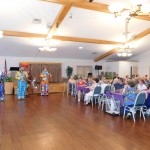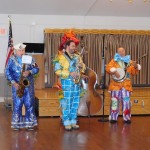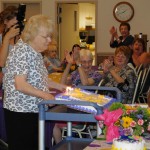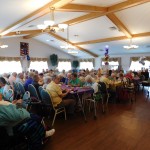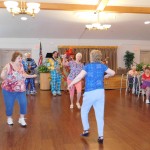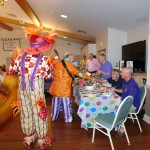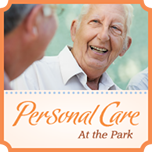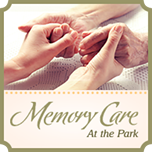 The residents of Gloria Dei Senior Communities have once again donated much needed supplies to some of the surrounding schools in the greater Philadelphia area. This year, our residents attended Spruance School in Northeast Philadelphia on Wednesday, August 24th and Benjamin Rush Elementary school in Bensalem on Monday, September 12th with the intention of contributing important classroom items, as well as some sports equipment for the kids to play with during recess.
The residents of Gloria Dei Senior Communities have once again donated much needed supplies to some of the surrounding schools in the greater Philadelphia area. This year, our residents attended Spruance School in Northeast Philadelphia on Wednesday, August 24th and Benjamin Rush Elementary school in Bensalem on Monday, September 12th with the intention of contributing important classroom items, as well as some sports equipment for the kids to play with during recess.
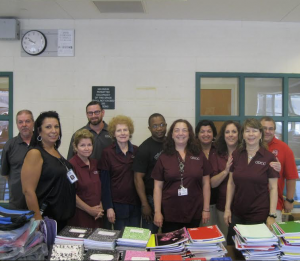 Once again, this act of charity is 100% resident driven and funded by the CARES Committee of Gloria Dei residents. These are members of our community who donate their time, their energy, and their money for the goodness of others. Gloria Dei CARES Committee residents take great pride in providing assistance each year and giving back to needy communities’ schools. We’re entirely proud of them and truly believe that we have the best residents!
Once again, this act of charity is 100% resident driven and funded by the CARES Committee of Gloria Dei residents. These are members of our community who donate their time, their energy, and their money for the goodness of others. Gloria Dei CARES Committee residents take great pride in providing assistance each year and giving back to needy communities’ schools. We’re entirely proud of them and truly believe that we have the best residents!
Check out some other photos below!
As you get older, you may notice a few changes to your body, as compared to when you were younger. Minor aches and pains are to be expected, and although these little things may not be a sign of disease, they can be frustrating. However, it may become a little less frustrating if you understand why these changes are happening. It’s always good to understand the reason behind something, and in doing so, possibly prevent or reduce the amount of age related changes occurring to your body.
Below you will find some of the more common ailments that trouble people as they age and tips to reduce the symptoms or frustration they produce. Not everyone ages the same way, however. These are not “one-size fits all” suggestions to cure all of your maladies. They are merely simple resolutions to common problems.
Skin
Our skin constantly creates oil to keep it smooth and flexible. Without this oil our skin would be the same texture as dried leather. Unfortunately, as we age, the production of this oil becomes less and less, giving way to more wrinkles and more dried skin. At times, your skin may feel like dried leather making it very itchy, which can lead to bleeding from too much scratching. This is especially possible in the winter time when there is less moisture in the air.
Luckily, there are plenty of skin care creams that can help provide you with the natural oils your skin needs to refrain from becoming dried out and itchy. Maintaining your skins health can be as simple as rubbing on cream to your hands, arms, and legs when you wake up and right before you go to bed!
Bones and Joints
Bones lose density over time. This is due to the body’s inability to absorb the same amount of calcium it was capable of when you were younger. Since bones need this calcium to build up strength, they ultimately become weaker as we get older.
In order to maintain strong bones, all one must do is alter his or her diet. By adding more dairy products into breakfast, lunch, and dinner you’ll be making up for your body’s inefficiency to absorb that calcium. You may also take calcium supplements if you find it harder to consume more milk, cheese, yogurt, etc.
Joints become inflamed or ache due to the thinning of cartilage. Cartilage is a structural component of our body that lines the area between two bones. If we didn’t have cartilage, our bones would essentially rub together whenever we performed any task at all, causing a good deal of pain.
This is the case as we get older, unfortunately. Due to the extended use of our joints throughout our life time, the cartilage becomes worn and thin. If you’re experiencing moderate to severe pain in your joints, over the counter or even prescribed medication may be the way to go. It’s important to check with your doctor first, though. The new medications may not mix well with the medications you’re currently taking.
However, if the pain isn’t as severe, physical therapy may be your best bet. This will help strengthen the muscles around your joint to help stabilize it. This will increase your range of motion for that specific joint and decrease the pain associated with it.
Oral Health
Since teeth and bones are made up of mostly the same material, what can happen to your bones can happen to your teeth. And much like your skeletal system, you only get one set of permanent teeth, so you better take care of them!
One way to do so is ensuring you do not suffer from dry mouth. Our saliva is very important to us, believe it or not. Not only does it aid in digestion to soften our food, but it also helps wash away bacteria in our mouth after we eat. If the bacteria does not get washed away, it sits on our teeth, producing acid that eats away at our enamel. This is how you get a cavity, which is basically an open infection in your tooth. Like any other type of infection, it can spread causing severe decay within our mouths.
Regular trips to the dentist office can stave off any type of oral infection. However, if you haven’t been to the dentist in a very long time, try drinking more water. It keeps your mouth from getting too dry and washes bacteria away as well. There are also types of toothpaste you can use in order to get rid of dry mouth.
Your Senses
Unfortunately, the decline of your senses is totally age related and very hard to avoid. You’re going to need some good genes if you wish to keep your sight, hearing, taste, and smell as good as it was when you were young. That’s not to say there’s nothing you can do about it!
Glasses and contact lenses can help you read that tiny text and drive at night time. Hearing aids are becoming less and less invasive, so you don’t have to feel self-conscious wearing one. And using fresh herbs and spices in your cooking can help overcome the notion that foods taste and smell bland to you now. You don’t have to sit back idly and accept that your vision, hearing, etc. will never be the same. There are ways to improve them due to the ever increasing technological discoveries in the medical field!
Aging is a Gift
Now that you understand a little bit more about the common ailments disturbing your daily life, it’s possible to treat them with better care, as opposed to ignoring them. Remember, there’s no reason to feel shame over losing your hearing or seeing a few more wrinkles on your forehead. Aging is a gift. Not everyone gets to experience it.
In a world plagued with uncertainties, there are constants in our life that we can always just assume. The earth will continue to revolve around the sun, gravity will continue to pull us down to this earth, you’ll never get away from paying taxes, and your furry friend will always shower you in unconditional love! That will never change.
No matter how terrible your day was, having your dog or cat greet you with all that excitement the moment you walk in the door is uplifting and puts you in a better mood instantly. They’re wonderful companions. In fact, most people consider them a part of the family. The amount of love they show us can wipe away any anxiety or depression we’re feeling, and they can ultimately do the same for dementia and Alzheimer’s patients.
One major benefit is their lack of judgment. This may seem like a silly observation, but it’s very important. Humans can be very judgmental, even when we don’t mean to be. We’re constantly sizing each other up and trying to compare everyone to ourselves. It’s just our nature. However, animals do not do this. They are not critical. For someone with dementia, those qualities alone make them a great friend. Communication is very difficult for dementia or Alzheimer’s patients. For them to experience the joys of a pure friendship without verbal communication can be very rewarding. This alone helps to boost people’s moods and lower their level of agitation.
Perhaps you’re considering taking your own pet to a dementia community for the residents to enjoy? There are a few things to consider when doing this.
- Animal’s energy level
- Overstaying your welcome
- Dementia patients’ moods are unpredictable
- Time of day
Some of these points are self-explanatory. For instance, point number one: If you’re bringing your dog to a community, he or she cannot be racing around the halls and barking in the faces of the residents. This will certainly cause more agitation and more anxiety. You’re doing too much harm and not enough good. The more calming demeanor your pet has, the more enjoyment everyone will get out of their presence.
Nevertheless, let’s say your pet is calm, and he or she is behaving nicely with the folks of the community. You must always be wary of points 2 and 3. They play into each other, because you do not want to overstay your welcome. One moment a resident may enjoy the company of your pet, while the next they may want to be left alone. The moods of dementia and Alzheimer’s patients can fluctuate quickly and without reason. It’s not your fault, and it’s not your pet’s fault. It’s just something you should take into consideration if you’d like for your pet to become a service animal.
The final point involves understanding the time of day when you are visiting. Patients may be a little more agitated during the evening, as opposed to the morning or afternoon. This is due to Sundowner’s Syndrome. If you would like for you and your pet to make the most out of your visit, it’s best to make an appearance well before the sun is beginning to set. If you can consider these 4 things, your four-legged friend may just become everyone’s new best friend!
All in all, whether it’s a dog, a cat, a bird, or even an aquarium in a living area of a dementia community, you can expect to see much brighter attitudes from the residents within that community. Companionship is something that is so important to humans. There’s something written within our DNA that makes us feel good when we feel like we belong with everyone. However, that feeling is not solely dependent upon other humans. Our animal companions can provide us with that positive emotion just as well. That’s why having pets within these types of communities provides such an uplifting beat for the residents!
On July 26th, Gloria Dei Estates celebrated a centennial event! The community itself was not turning 100, however one of its residents was doing just that. Stanley Nanczuk, who graduated from Roman Catholic High School and who fought at Iwo Jima, celebrated 100 years on this Earth.
The event was highlighted by speeches and presentation of recognition certificates from:
- Thomas F. Johnston, President of Roman Alumni
- John P. Sabatina, Jr. State Representative 174th District
- Brian J. O’Neill, Minority Leader 10th District Council Member
- Ed Neilson’s Office of the House of Representatives
Birthday cake and ice cream was enjoyed by all attending the birthday celebration along with a special performance by the members of the Polish American String Band.
To watch a video from the event, simply click the link here. Or you can peruse through some of the lovely photos taken during the festivities!
Have you found that your parent or loved one is having difficulty dressing themselves? Do they struggle to get into the shower every morning or evening? Is cooking a meal on their own too much of a task? If so, that means every day activities have become too burdensome for them. It’s a difficult decision, but you might want to start thinking about moving them into an assisted living facility. If you’d like to learn some of the warning signs, click here
You can enlist the help of a caregiver, but even caregivers have specific hours. You don’t want to worry about your loved one having trouble getting into bed or how they’re feeling late at night or early in the morning. A caregiver can’t tend to them 24 hours a day, 7 days a week. On the other hand, if a loved one were to move into an assisted living facility, you’d be able to rest easier knowing they’re being cared for constantly. These facilities have nurses and personnel working round the clock.
Active Living for the Active Aging
There are active communities and assisted living communities. If your loved one has no trouble with their day-to-day errands but just doesn’t want the added concerns of maintaining a home, then an active community is for them. By moving into an active community, your parent or loved one will be surrounded by like-minded individuals who are looking to remain active as they age. Most of these communities include a list of activities for the month and promote social events amongst their residents. This helps keep everyone physically and mentally stimulated.
As mentioned previously, assisted living facilities have nurses working 24/7 to assure everyone is safe and prepared to handle an emergency if a medical event were to happen. Active living communities don’t necessarily have nurses on-call, but there is usually someone working the front desk who is prepared to call 911 in case of a medical emergency.
Active living communities certainly stress the importance of allowing their residents an independent living situation, however they don’t want to place them in helpless situations by refusing to accept the actuality of a potential medical emergency. That is something your parent or loved one should not have to worry about.
Assistance For Those Who Need It
For those who struggle with clothing themselves, cooking meals, or maintaining their house assisted living is their best option. The idea of assisted living is not to remove one’s independence but aid it. A lot of these communities still promote healthy, independent lifestyles by creating activity lists from month to month, much like the active communities. However, the activities are toned back just a bit. Instead of long trips and big social events, the residents can enjoy crossword puzzles and other word games. They’re great at stimulating the mind and keeping one’s brain limber. A lot of people don’t realize that the brain is a muscle, too. It’s needs to be stretched and utilized in order for it to maintain its elasticity. Without the brain, one’s independence surely can’t be kept.
Dining Services
Unlike the active living communities, assisted living facilities have their own dining services. This allows your aging loved one to have nutritious meals thoughtfully planned out and brought right to them three times a day. This promotes a healthy diet.
If an elderly loved one is having an increasingly difficult time cooking on their own, they’re more likely to order out and consume foods that are not as nutritious or receive an insufficient amount of foods that are. That’s why dining services are very important within an assisted living facility.
A lot of the time, residents within these types of communities have a hard time remaining active. Some of them are confined to a wheelchair, so their diet is very crucial for their overall health, but if a person is receiving the proper amount of vitamins and nutrients in their daily meals, their ability to age in a healthy manner remains in tact.
Different Communities for Different Individuals
As you can see, these two differing communities are for two different lifestyles. However, they both have the same goal: Healthy aging. Active living communities and assisted living facilities all look to aid their residents to be a little more social, a little more stronger, and much more vigorous!
We encourage you to visit our communities by clicking the link here. It’ll take you to our “request a tour” page where you can experience Personal Care at The Park or a number of our Active Living communities. Don’t hesitate! Sign up today to start exploring with your parent or aging loved one!
As the number of Alzheimer’s disease and dementia patients rises, so has the number of treatment options for these cognitive impairment disorders. Research facilities all over the world have been in search of the miracle cure that can stop and ultimately reverse the effects of the different types of dementia. Unfortunately, nothing has been created so far, but minor breakthroughs are occurring.
Specific treatment options have been discovered that help dementia patients manage their symptoms and show signs of cognitive improvement, though temporary. These treatment options do not promise a miracle cure, but do provide brief moments of clarity. They include:
Art Therapy
Art therapy is an effective means of communication. Often times, those affected by dementia have a hard time expressing themselves. By giving your loved one an empty canvas and a full palette of colors, you’re giving them the opportunity to express what they’re thinking and feeling, even if it simply involves choosing a color that aligns with their mood. In doing so, you’re providing them the opportunity for brain stimulation that provokes activity on a cognitive, sensory, and emotional level. As a result, an individual may have an improvement in their mood due to a decrease of anxiety. Their emotions become positive ones and their overall well-being is increased. This is because all humans have the need to express themselves. People with dementia still have that urge but lack the ability to do it or find it extremely difficult to do so. Art therapy makes it easier for them to access their feelings.
Music Therapy
According to the Alzheimer’s Foundation of America (AFA), “rhythmic and other well-rehearsed responses require little to no cognitive or mental processing. A person’s ability to engage in music, particularly rhythm playing and singing, remains intact late into the disease process because, again, these activities do not mandate cognitive functioning for success.” As a result, music therapy is an effective means to treat dementia symptoms. It allows for memory recall. We often attach memories to familiar songs, so when we hear them again, that same memory is still attached. Music therapy invokes brain stimulation much like art therapy. This, again, acts as a mood booster for someone with dementia and increases opportunities to interact socially with others.
Pet Therapy
A final form of therapy for a person with Alzheimer’s or dementia is pet therapy. This involves highly trained cats or dogs that act as companions for aging adults. Research has shown that someone with Alzheimer’s or dementia can recognize these furry faces as friendly. In turn, they’re highly likely to interact with them in a positive sense. Social interactions, even with an animal, are very important for people with dementia. It reduces agitation and increases their peace of mind. It’s also a feeling of comfort if they had pets sometime in their life.
Therapy animals can also help seniors receive more exercise. They can take the animals on short walks, as these animals are trained to be well-behaved on the leash. They walk right alongside whoever is holding it. That way a senior can walk at their own pace, and have a wonderful companion by their side during the entire duration of the walk. It’s a win-win for someone with Alzheimer’s or dementia!
Try Different Treatments with your Loved One
These are simply 3 examples of various therapies that provide brief moments of clarity to elderly loved ones. There are more out there and more specific forms of art therapy, too. However, these treatment options do not demand much upkeep. If you have paper and crayons, your loved one can participate in art therapy. If you have an iPod and a list of their favorite songs, they can participate in music therapy. Pet therapy requires animals with special training, but they are not rare to find. If you believe a loved one would benefit greatly from any of these various treatment options include it in your daily activities. You may just see their mood improve as well at their social interactions!
